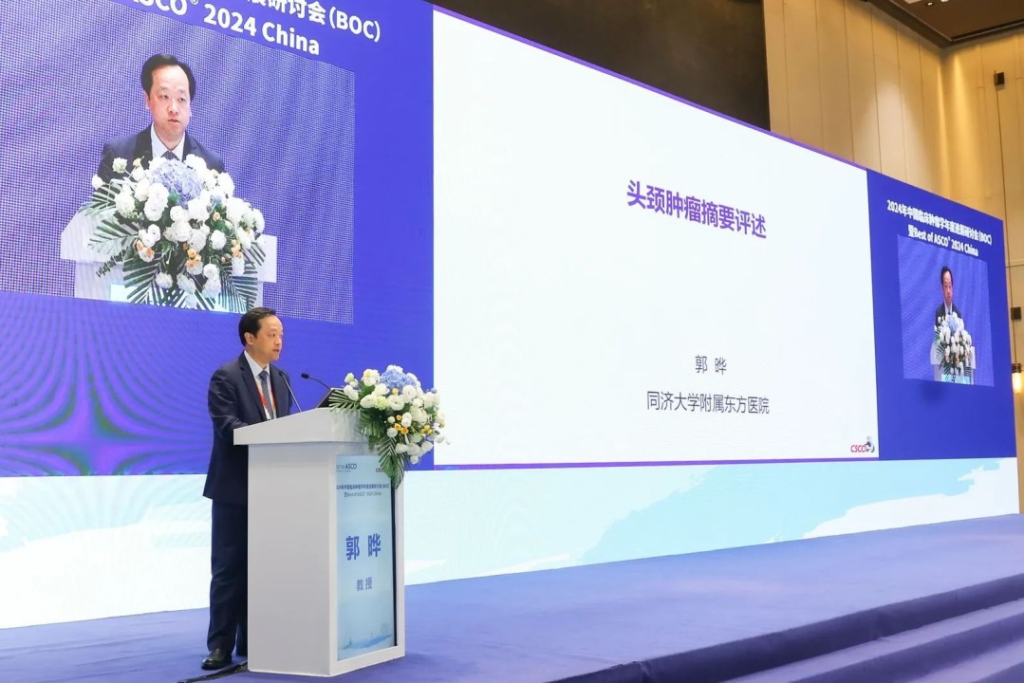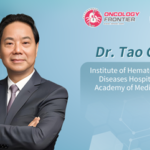
Editor's Note: Head and neck tumors are common malignant tumors among Chinese residents, significantly impacting organ function, quality of life, and prognosis due to disease progression and treatment effects. The "2024 Annual Progress in Clinical Oncology Conference (BOC) and Best of ASCO 2024 China" was recently held in Guangzhou, showcasing the progress of clinical oncology research in China and sharing cutting-edge information from the ASCO conference. On this occasion, "Oncology Frontier" invited Dr. Ye Guo from Shanghai East Hospital , Tongji University to share key research insights related to head and neck tumors.
01
Oncology Frontier: As a review expert for the head and neck tumor session at the BOC/BOA conference, how do you evaluate the recent advances in basic research and clinical diagnosis and treatment of head and neck tumors? What global research hotspots are worth paying attention to?
Dr. Ye Guo: This year’s ASCO conference head and neck tumor session did not produce any studies that could change current clinical practice, but three studies shared at the BOC/BOA conference stood out. The first study compared different radiation techniques. Currently, proton therapy and photon therapy have become standard treatment modalities for head and neck squamous cell carcinoma (HNSCC), potentially improving patients’ quality of life. Many domestic centers have established or are starting to use proton therapy. For head and neck tumors, both surgery and radiation therapy can affect organ function and may cause toxic side effects, making these important research endpoints. This study showed that for locally advanced HNSCC, especially HPV-positive or negative oropharyngeal cancer, proton therapy’s overall efficacy is comparable to photon therapy, with proton therapy exhibiting higher safety and tolerability.
The second study focused on an adjuvant immunotherapy phase II clinical trial, which did not achieve positive results. In China, a significant proportion of head and neck tumor patients are oral cancer patients who may frequently undergo salvage surgery. Exploring adjuvant immunotherapy could further improve the efficacy for these patients.
The third study analyzed robotic surgery. Domestically, the number of robotic surgery installations is among the highest in the world. Results from the ASCO conference this year showed that for head and neck tumors, especially HPV-positive oropharyngeal cancer, robotic surgery can achieve good outcomes. Moreover, with the support of neoadjuvant immunotherapy, many patients might be exempt from adjuvant radiotherapy, significantly improving their future quality of life. These are three very important studies from this year’s ASCO and BOC/BOA conferences.
02
Oncology Frontier: Precision medicine has become deeply ingrained and has broad application prospects in head and neck tumors. How do you think we can better leverage the advantages of precision medicine to promote the development of personalized treatment and bring more benefits to patients?
Dr. Ye Guo: Precision treatment began with targeted therapy for lung cancer and has now extended to various types of tumors. HNSCC relatively lacks driver genes, but rarer salivary gland cancers have entered the era of precision treatment. For these “niche” adenocarcinomas, testing for androgen receptors and HER2 expression can guide endocrine therapy as recommended by guidelines. The well-known “diamond” target, NTRK mutation, can occur in various tumors, and in secretory carcinoma of the salivary gland, which is a subtype of salivary gland cancer, the NTRK fusion mutation rate is as high as 70%. Patients with this mutation can achieve good outcomes with NTRK inhibitors.
Additionally, precision treatment for HNSCC is more focused on recurrence prediction or efficacy monitoring, especially for minimal residual disease. Several studies have confirmed that for locally advanced HNSCC, using ctDNA testing helps early detection of disease progression and recurrence, allowing for earlier intervention treatments, including surgery and drug therapy. Therefore, the precision treatment of HNSCC warrants further in-depth research in the future.
03
Oncology Frontier: Immunotherapy has brought new treatment paradigms for head and neck tumor patients. Can you discuss whether patients who have undergone radical surgery or chemoradiotherapy alone can benefit from immunotherapy? Additionally, how can we better screen patients suitable for immunotherapy?
Dr. Ye Guo: There is only one study on adjuvant immunotherapy for locally advanced patients post-surgery or radical chemoradiotherapy, namely the large-sample phase III study of atezolizumab, but unfortunately, it did not meet the primary endpoint. I believe we need to further refine the treatment model stratification for locally advanced HNSCC. Typically, the treatment for locally advanced HNSCC is complex, usually involving either a surgery- or radiotherapy-dominated radical approach, but the adjuvant immunotherapy microenvironment differs significantly between these two modalities.
In the future, we need to explore biomarkers beyond PD-1 expression to allow more patients to enter clinical trials and investigate the efficacy of adjuvant immunotherapy. Compared to other solid tumors, HNSCC has many unique characteristics, primarily its higher propensity for local recurrence and lower rate of distant metastasis. Therefore, achieving the goal of reducing distant metastasis through adjuvant immunotherapy is quite challenging.
Dr. Ye Guo
- Deputy Director of the Oncology Department and Director of the Phase I Clinical Trial Center, Tongji University Affiliated East Hospital
- Deputy Secretary-General of the Chinese Society of Clinical Oncology (CSCO)
- Chair of the Head and Neck Tumor Professional Committee, Chinese Society of Clinical Oncology (CSCO)
- Vice Chair of the Head and Neck Tumor Professional Committee, Chinese Medical Doctor Association
- Vice Chair of the Nasopharyngeal Carcinoma Prevention and Treatment Branch, China Anti-Cancer Association
- Vice Chair of the Thyroid Cancer Professional Committee, Chinese Society of Clinical Oncology (CSCO)
- Member of the Head and Neck Tumor Professional Committee, China Anti-Cancer Association
- Member of the Nasopharyngeal Carcinoma Professional Committee, China Anti-Cancer Association
- Vice Chair of the Head and Neck Tumor Professional Committee, Shanghai Anti-Cancer Association


